The Guardian examined what happens when homeless people are sent out of town with bus or plane tickets. The report includes charts showing where people go. One distribution chart reveals that many are relocated to places with lower median incomes.
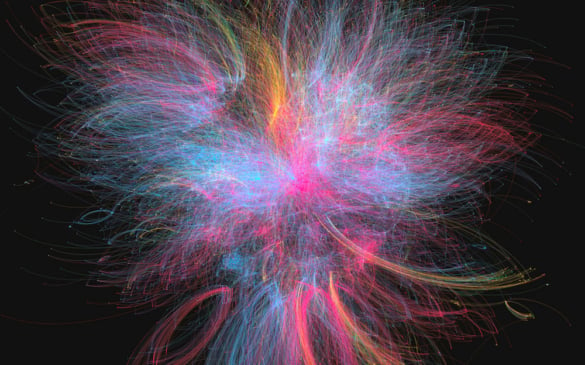
Data visualizations are used by reporters, researchers, and companies to explain information clearly. When done well, a good visualization gets shared widely on social media and other platforms.
This makes data visualization useful for businesses that want their content seen by more people. But building an effective visualization takes time and planning. To do it well, the creator needs to:
The most important step is choosing the right type of chart or graph. Below is a set of recent examples that were widely shared and reached large audiences.
Table of Contents
The following examples show how recent data visualizations have helped people share information clearly. Each one uses a different format to explain complex data in a simple way.
This chart shows which websites have the most traffic worldwide. The size of each bubble shows how large each site’s audience is. A smaller bar chart inside the main image shows the main industries for these websites.
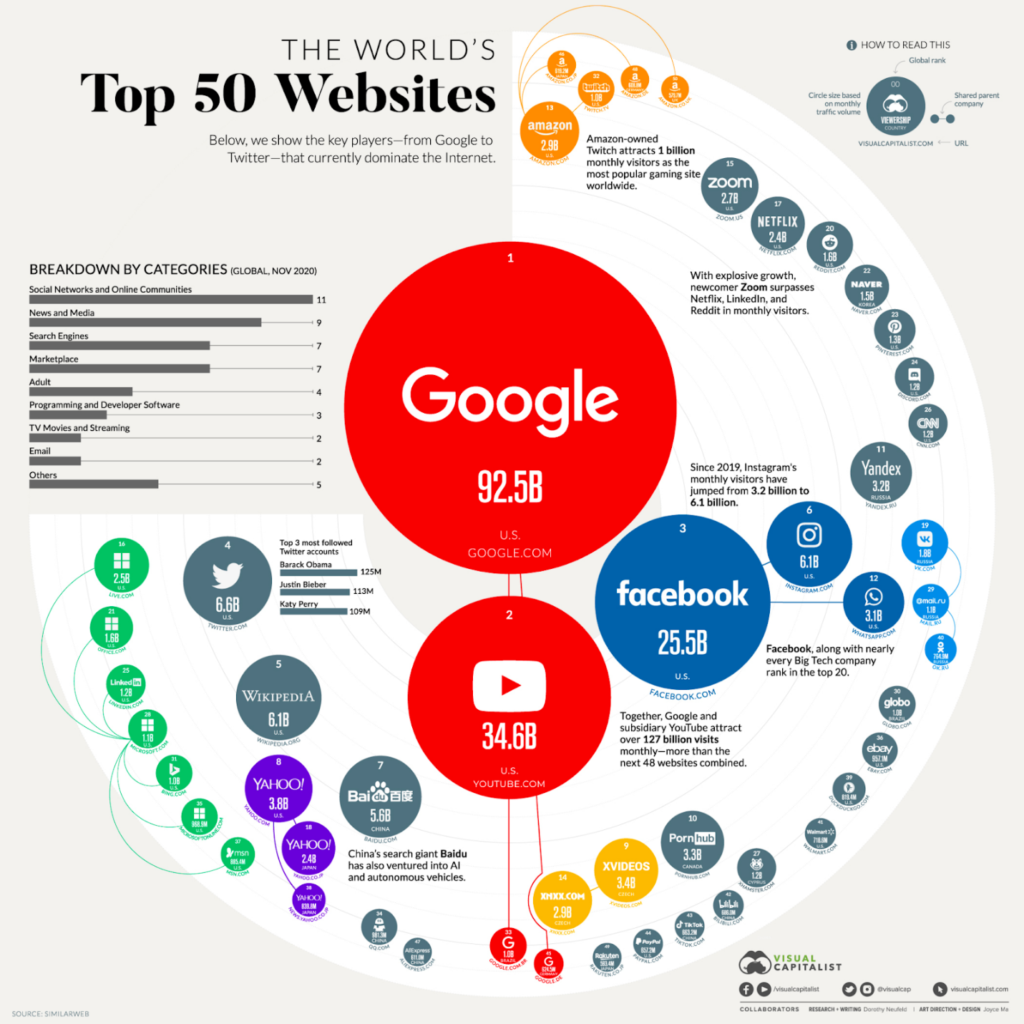
Some of the most effective data visualizations use public data. This one by Alasdair Rae uses population data from the European Union. It shows how population density changes across Europe using a clear geospatial layout.
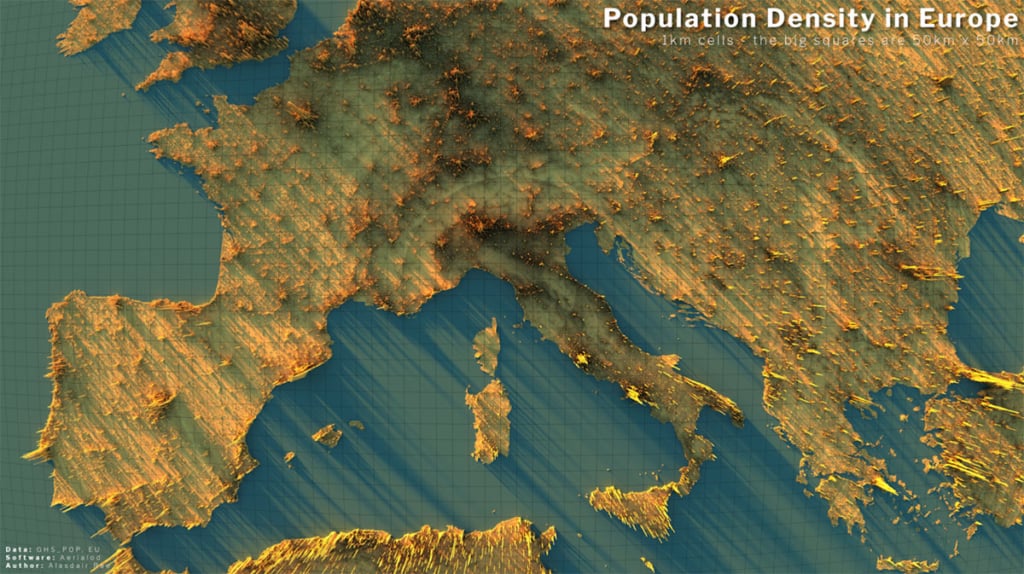
A scatter plot can help explain how governments function in different countries. This example compares how involved governments are in people’s lives. It lets viewers see patterns across nations and understand different approaches to governance.
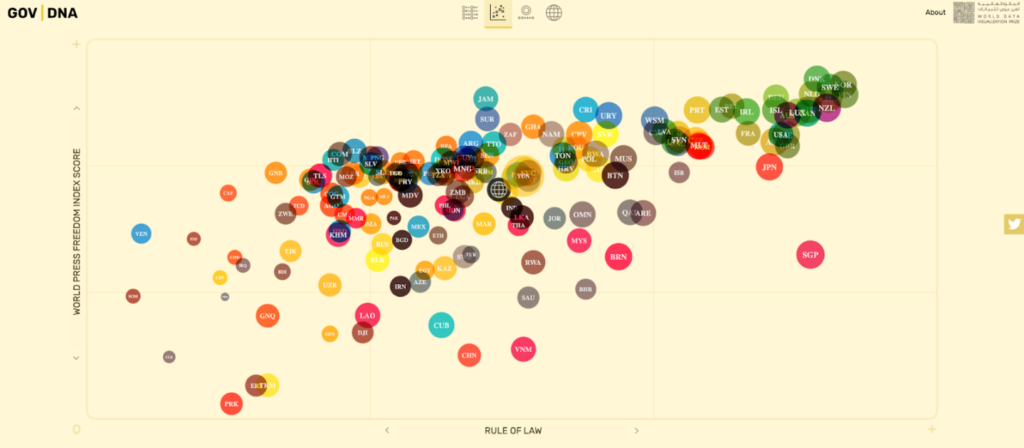
Since 1977, Star Wars films and shows have introduced a wide range of characters. Kirell Benzi created a visualization called The Dark Side and the Light that maps how these characters interact. It shows the links between major and minor characters across different parts of the series. The chart is clear and well-organized.
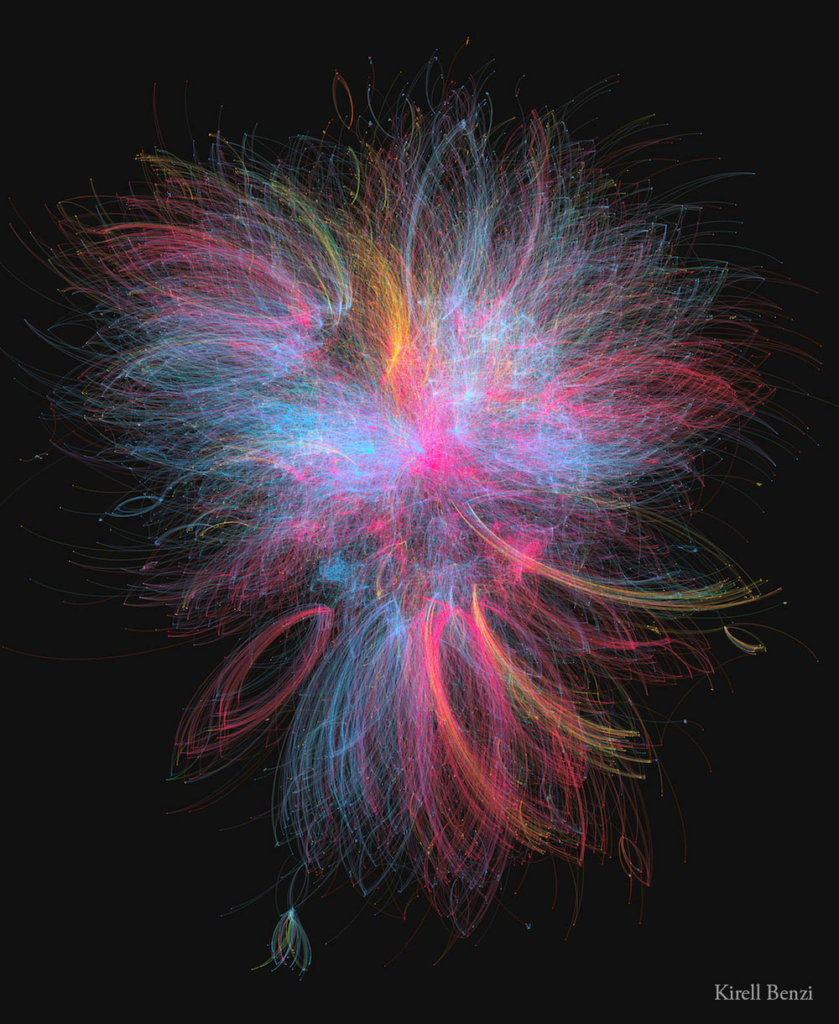
Researchers have used data visualizations to study how COVID-19 spread. One example is a video from Tectonix GEO. It shows a heat map built from Outlogic data that tracks the movement of spring break visitors in Fort Lauderdale. The map shows how these trips helped spread the virus to other parts of the country.
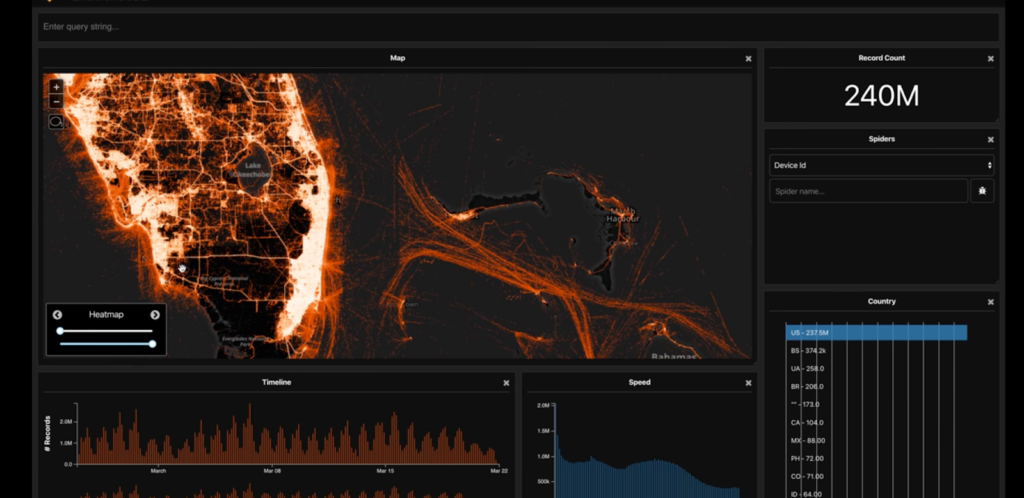
Many major publications now use data visualizations to support detailed reports. One example is a long-form article on cities in Africa. It includes clear, well-made charts that help explain the topics covered in the story. These visuals make the data easier to understand and more useful for readers.
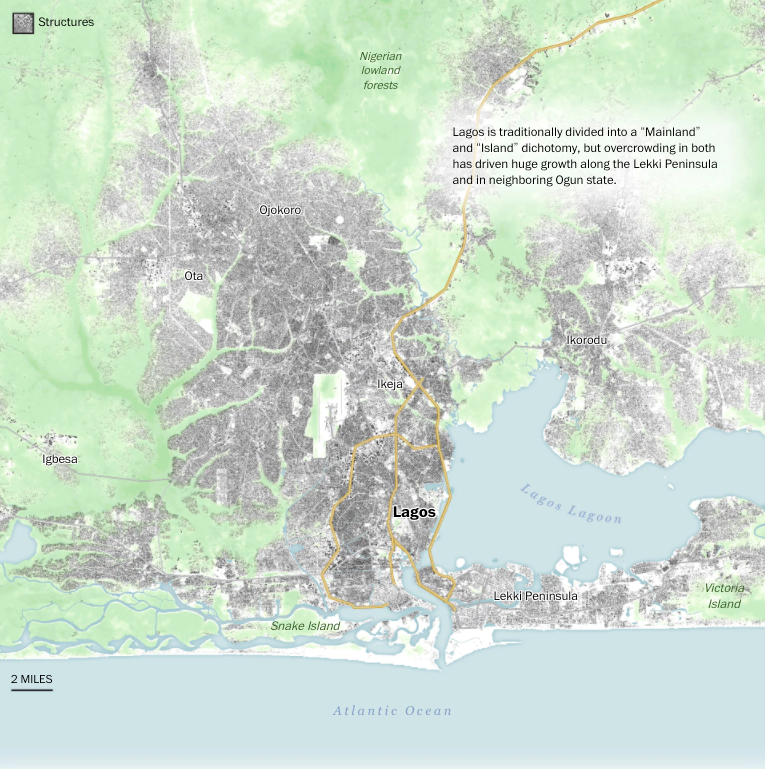
Data only helps if people can understand it. Many software tools now make it easier to turn spreadsheets, databases, and cloud data into interactive charts.
Microsoft Power BI is one of the most widely used tools for this. It lets users build dashboards that show live data and visuals. The example shown here uses Power BI to present global access to electricity in a simple, shareable format.
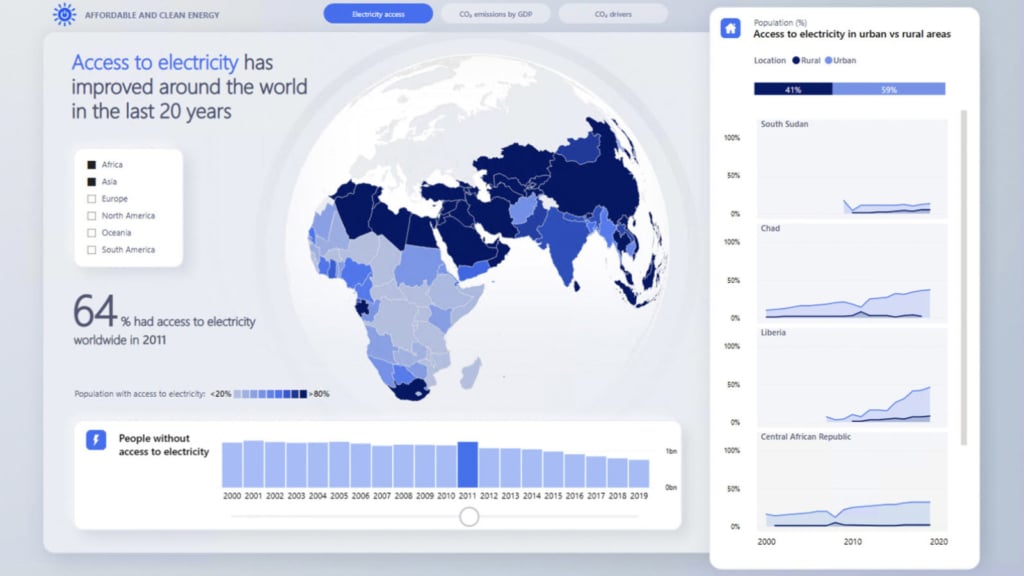
COVID-19 has received global attention since 2020, but other major pandemics have shaped history as well. This infographic shows the largest pandemics across centuries. It gives a clear timeline and helps viewers compare their scale and impact.
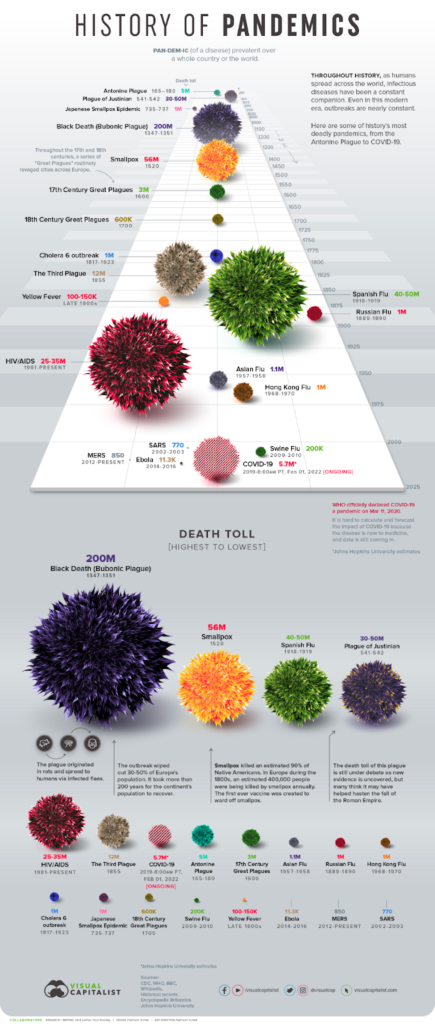
In 2021, a cargo ship blocked the Suez Canal and halted traffic in a key trade route. CNN created an interactive chart that lets users see how difficult it is to steer a ship through the canal. It shows the challenges of navigating large vessels in narrow spaces.
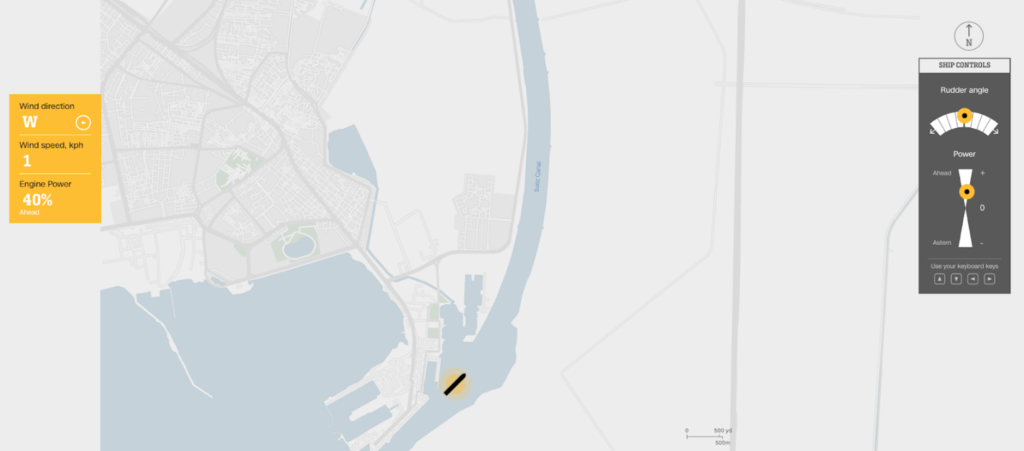
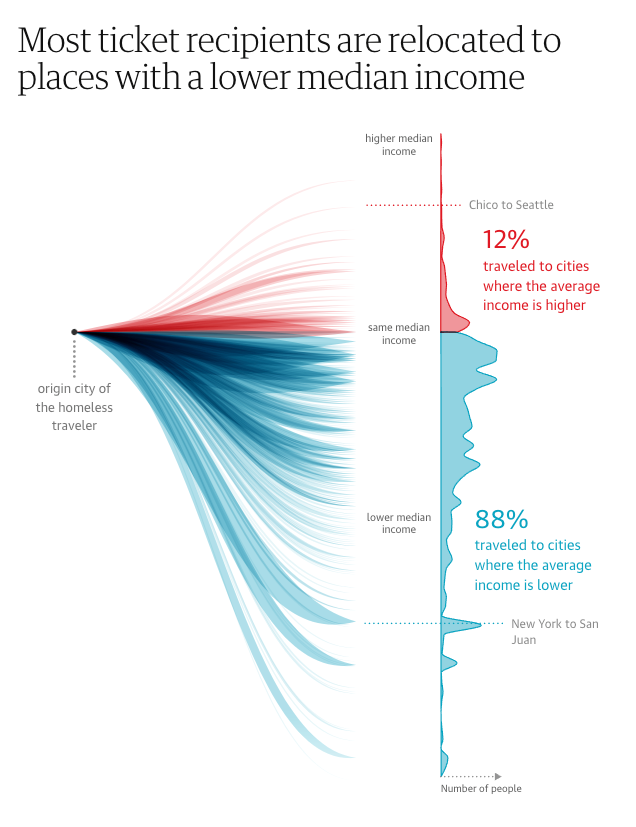
How do Americans spend their time? This animated unit visualization is based on data from the American Time Use Survey, and it conveys in time-elapse fashion what people are generally doing at different times of the day.
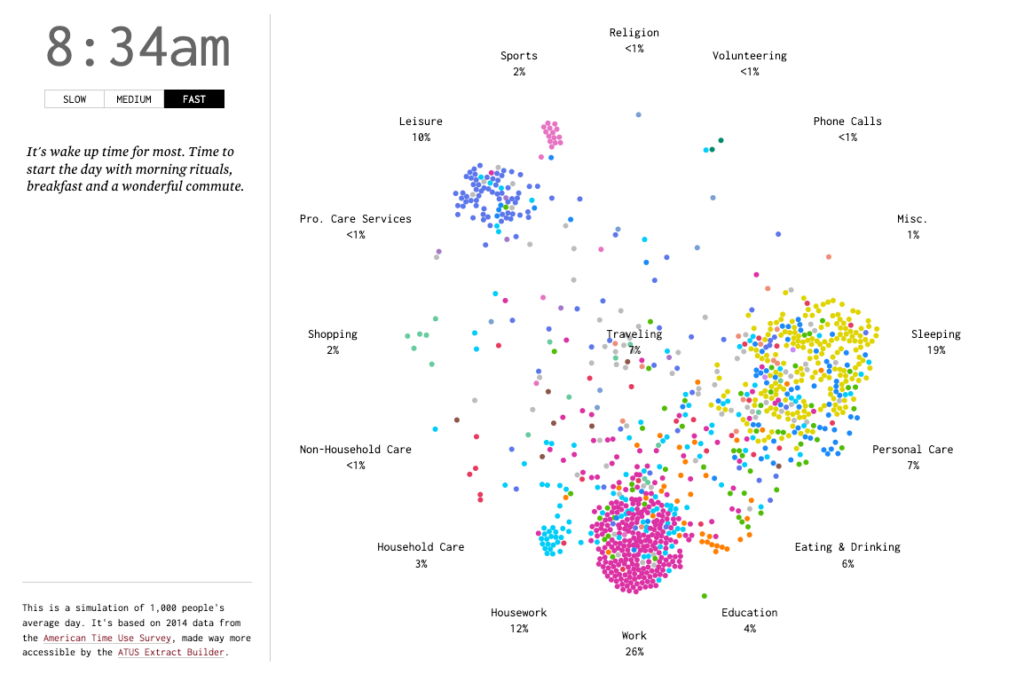
Wind holds the power to create energy and to destroy cities. These wind map visualizations share how the wind typically moves around us at any given time. While the data visualizations are meant to provide basic meteorological information, the maps are collectively a beautiful homage to the power of nature.
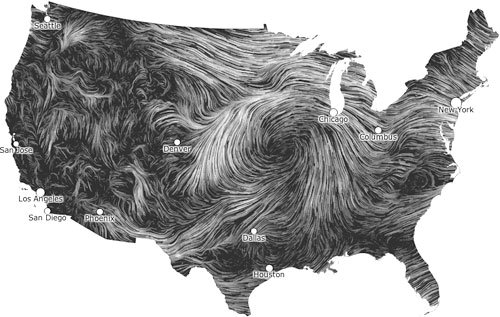
What’s the best way to stay overnight at national parks in the United States? Let data visualizations make recommendations for you. These radar chart visualizations help viewers better understand how national park visitors traditionally spend the night during certain times of the year.
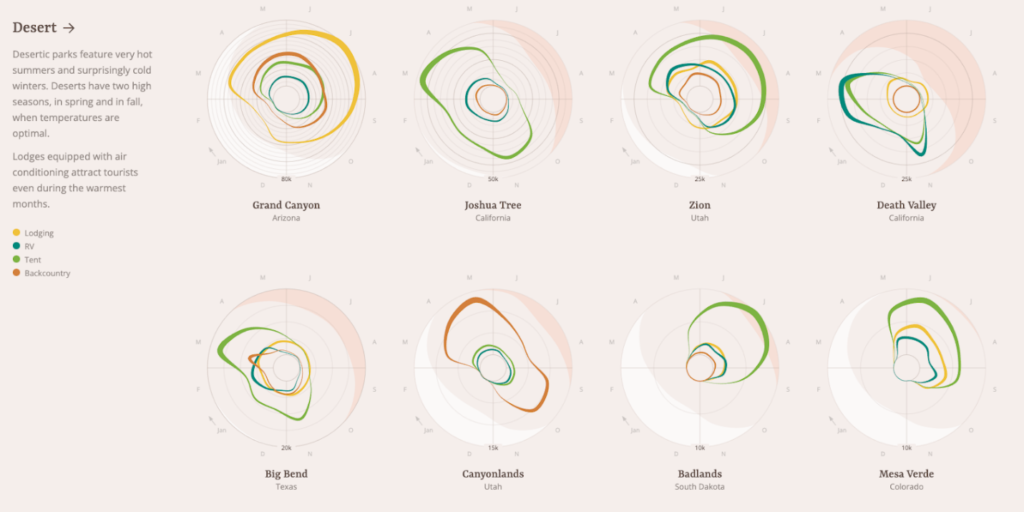
Wall Street investors are always looking for ways to get an edge on the competition. SmartMoney provides a so-called “map of the market” that allows anyone to track more than 500 stocks at the same time — visually. The tree map visualization is simple: green indicates a stock going up, and red indicates a stock going down.
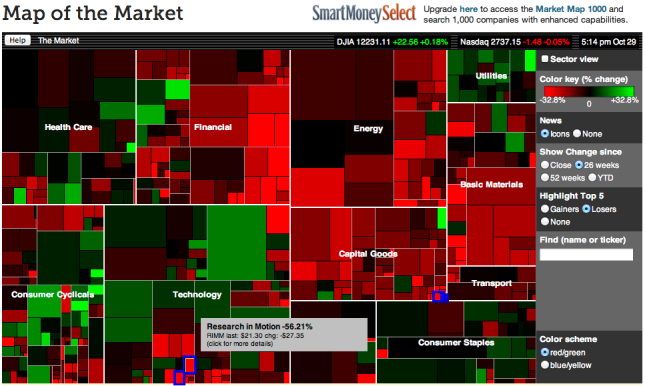
Alluvial chart visualizations are helpful when exploring how proportions change over time. For example, this visualization of 200 years of immigration to the United States shows how the proportion of immigrants from different parts of the world has changed through the years.
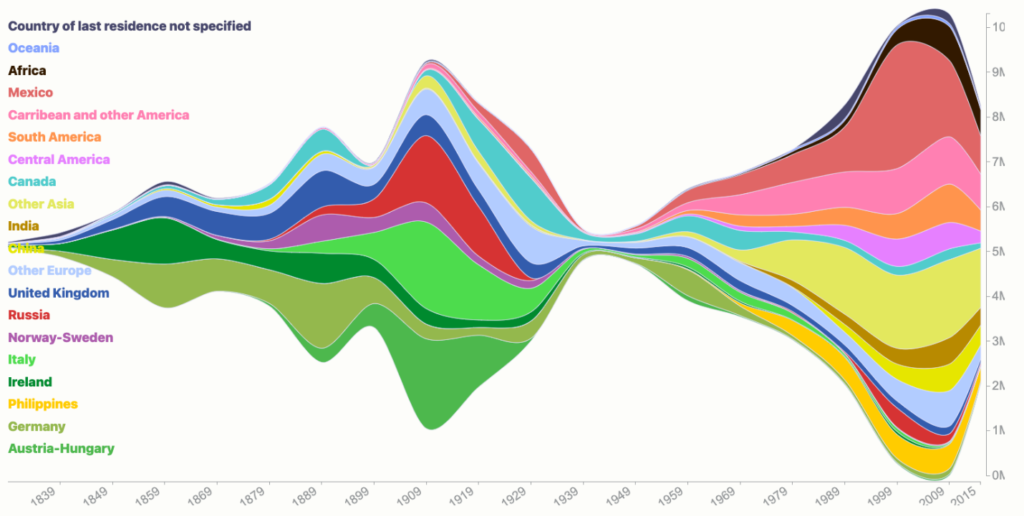
While some experts expect an even worse recession to happen in 2024, we all remember the so-called “Great Recession” of 2008-2009 far too vividly. It took about 5 years for the economy to regain the 9 million jobs it had lost, but each sector was affected quite uniquely.
The New York Times used this data visualization, including several informative line charts, to demonstrate how that economic crisis reshaped industries and the jobs that are available more than a decade after the Great Recession.
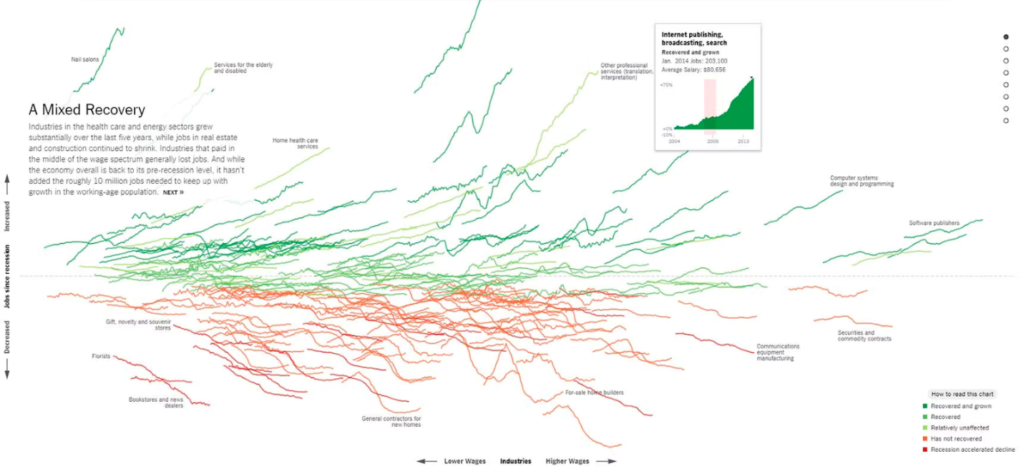
Presentations are the closest most of us get to creating visually pleasing assets on a day-to-day basis. Now, thanks to AI, we can get a lot closer to building presentations that are graphically beautiful, including graphs and charts that engage our intended audience.
As an example, Beautiful.ai is a cloud-based presentation software that uses AI technology to help users create visually stunning and engaging presentations quickly and easily. Below is an example of how it is able to combine design elements such as icons, images, and typography to create professional-looking presentations.
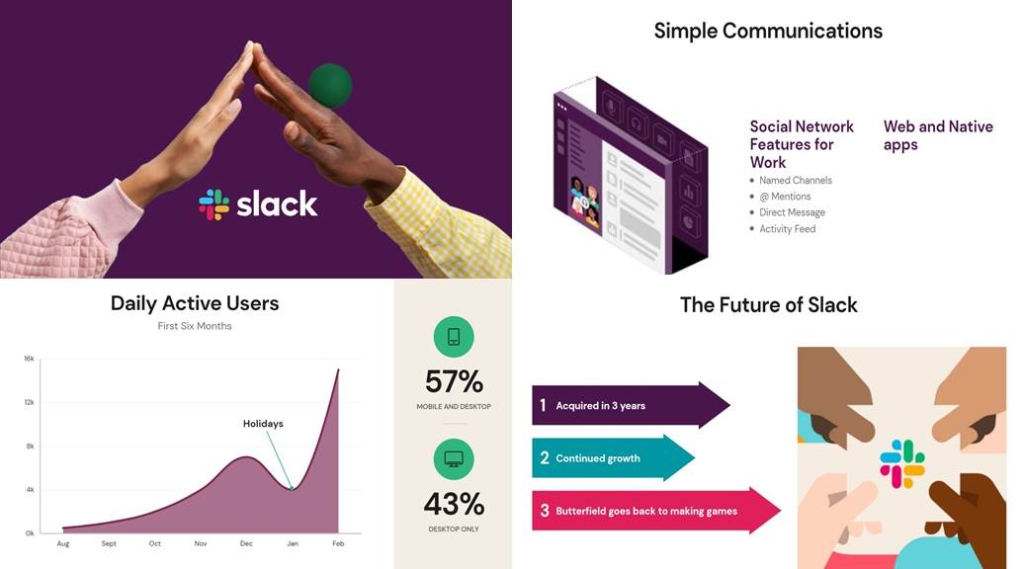
One of the most interesting COVID-19-related data visualizations to come out of the pandemic is this flow chart below, created by Reuters, which shares how viruses move from different bat species to other animals and then to humans.
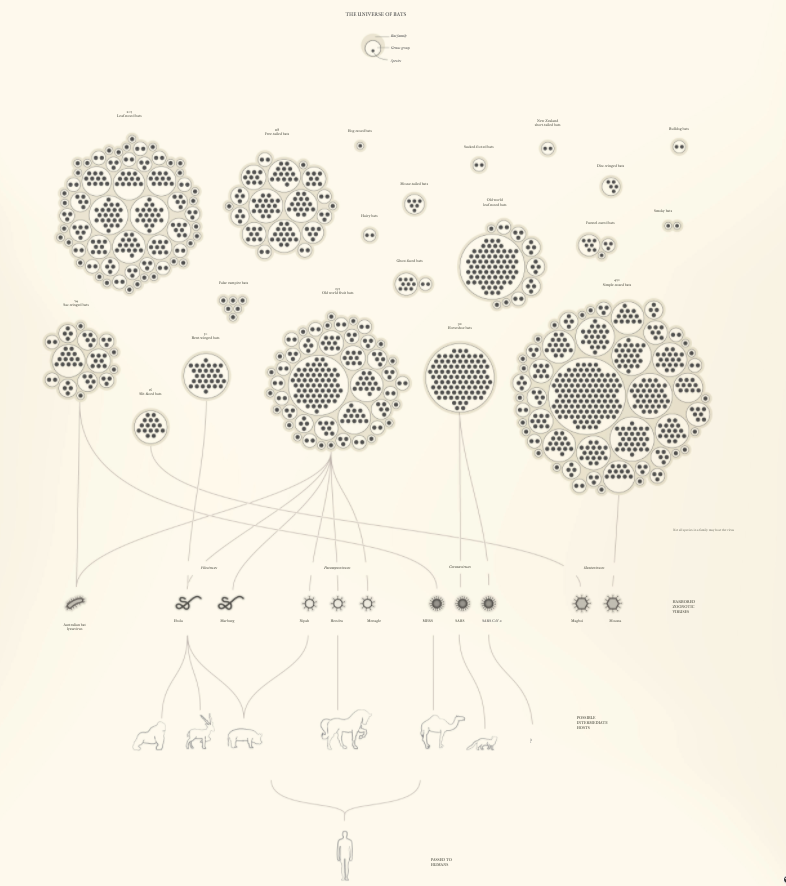
Where does a raindrop in any portion of the United States finally end up? This fun motion graphic visualization lets you choose the exact place of rainfall, and then it takes you on an adventure to where the raindrop meets its final resting place.
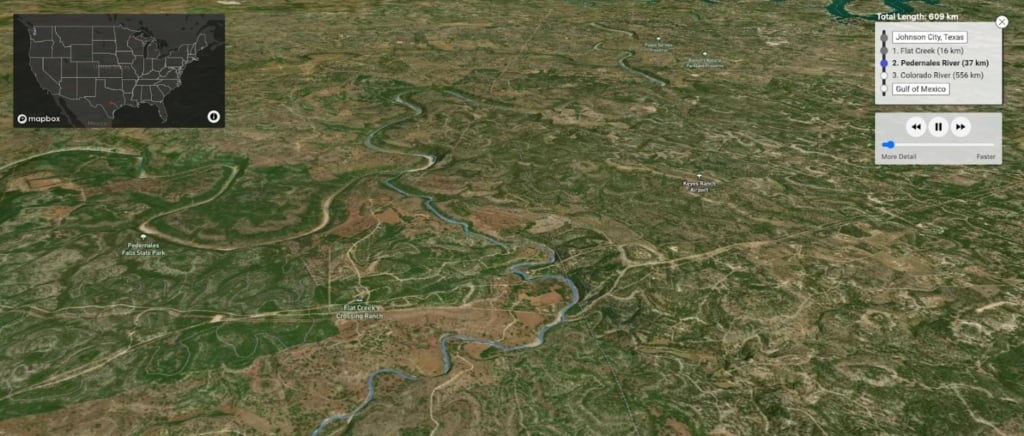
One of the newest developments in AI includes tools like DALL-E2, with the ability to generate surreal and creative images from textual descriptions. Even though it is still a relatively new tool, it has already found practical applications in areas such as interior design, fashion design, and product design.
DALL-E2 combines deep learning techniques, including generative adversarial networks (GANs) and transformers, to create images that match the text descriptions provided to it. For example, if given the prompt “an armchair in the shape of an avocado,” DALL-E can generate an image of an armchair that looks like an avocado, as you can see in the example below.
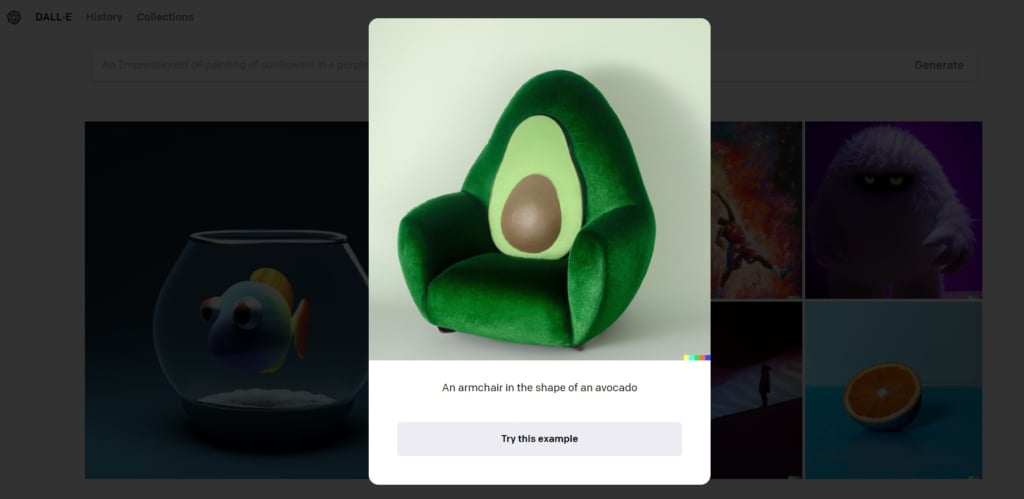
Heads of government around the world have a profound influence on global events and history. This timeline visualization provides details on who has led the world’s largest and most important nations and on whom world leaders have led alongside.
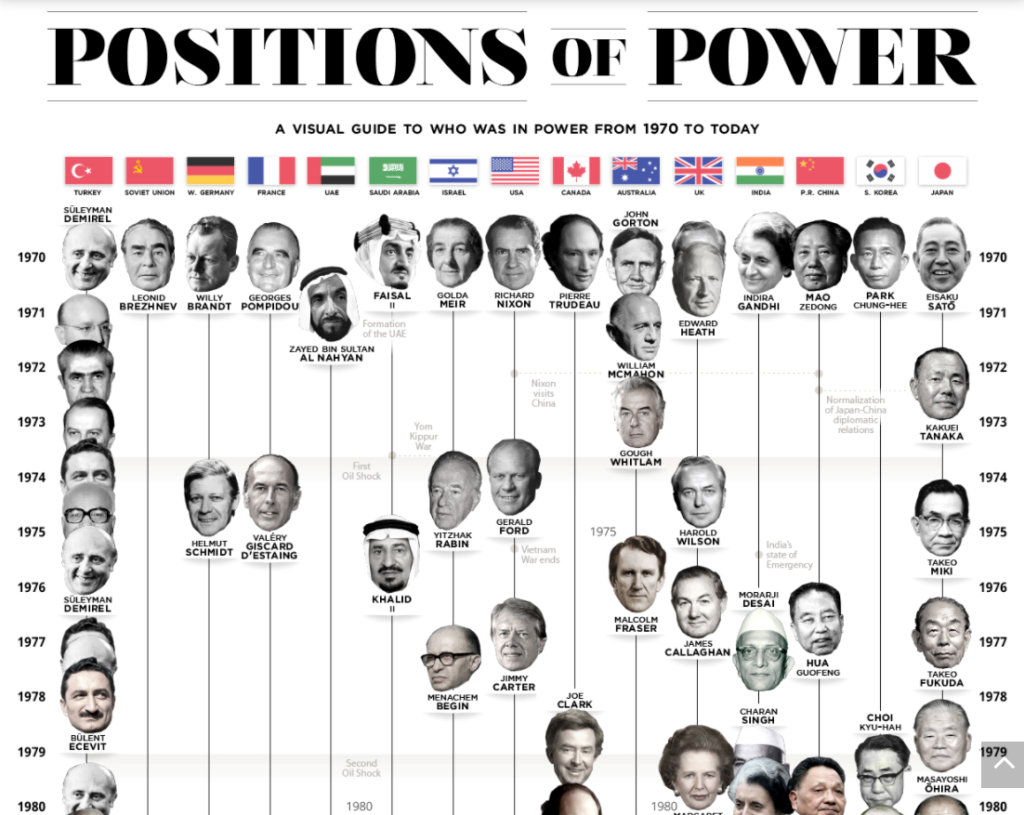
How many millions of lines of code are included in different codebases? This elegant bar graph conveys the information at a glance. When you’re working with data that reaches into the millions of millions, this type of data visualization helps you break things down into a more easily digestible graphic.
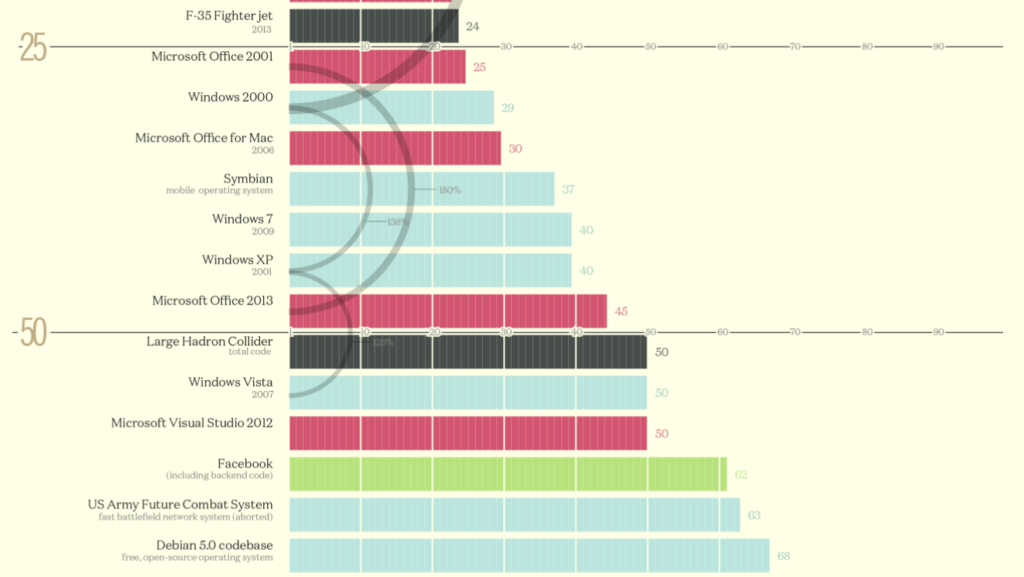
If you are trying to make sense of multiple sources of business data, one visualization alone is probably not going to cut it. To solve that, software like Domo allows users to connect to multiple data sources, transform data, and create custom visualizations to gain insights and make data-driven decisions.
Domo’s visualizations are designed to be highly customizable and interactive, allowing users to quickly and easily explore data and discover insights. In the example below, you can see a dashboard consisting of multiple visualization cards that come together to tell a story.
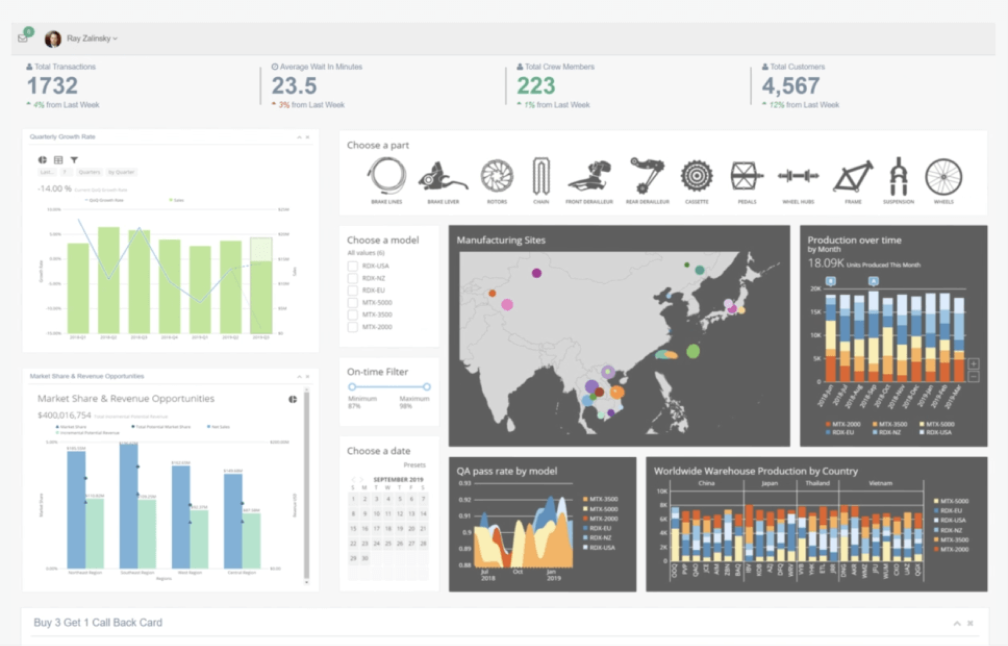
You likely know that certain foods pair better with certain wines than others. But few people have committed to memory exactly what food-wine pairings work best. This table visualization perfectly captures the best pairings for easy reference when you’re entertaining or otherwise trying to piece together a menu.
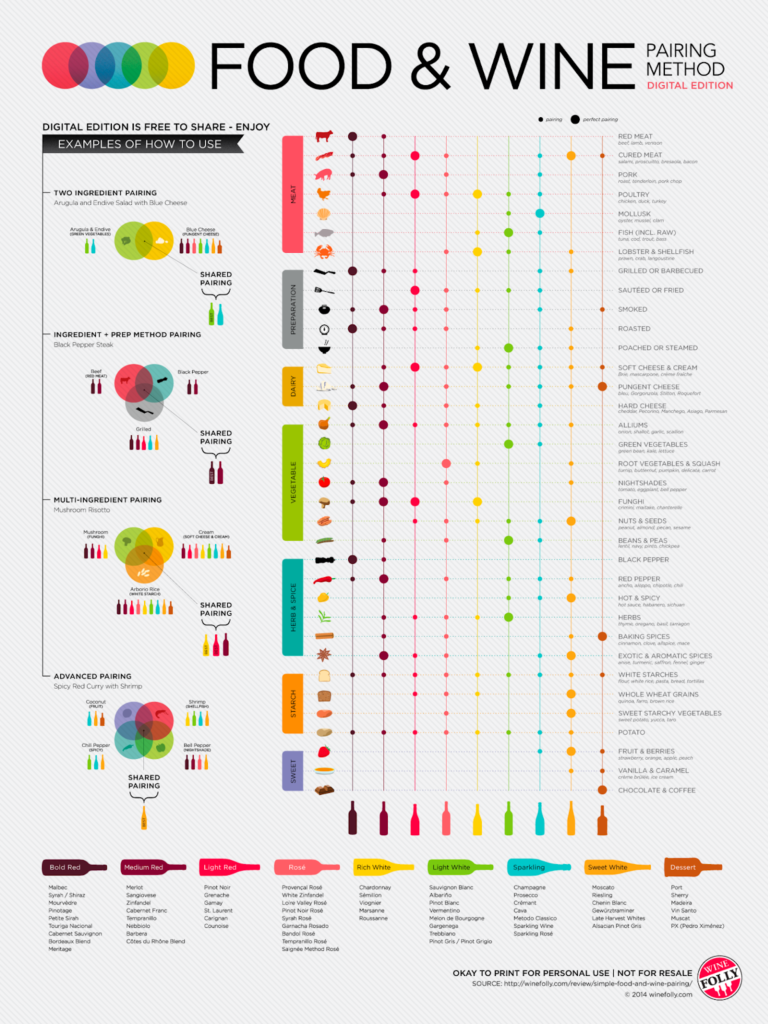
Our dietary preferences have changed greatly in the past few decades, including a marked rise in meat consumption and the use of vegetable oils. This donut chart visualization lets you explore different countries during different time periods to see exactly what people were eating.
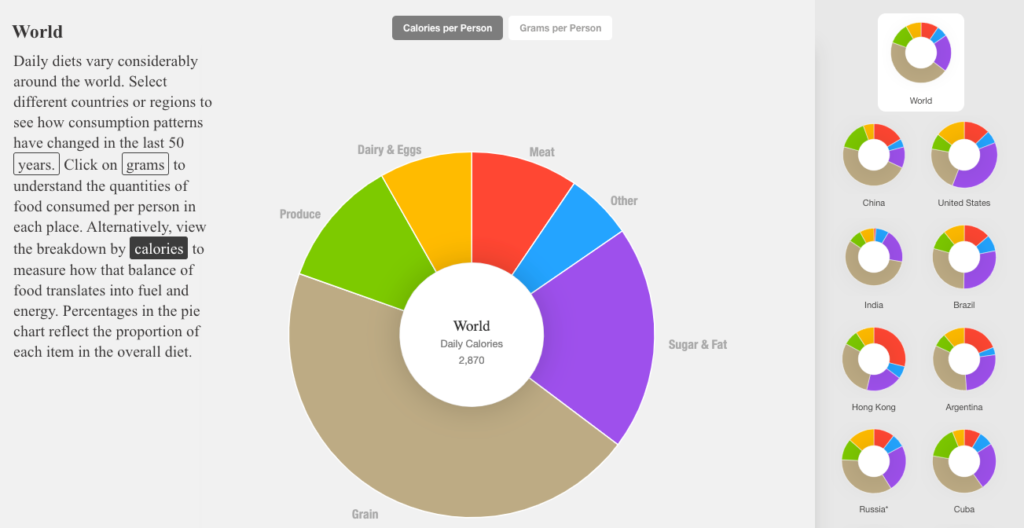
As seen in the examples above, different types of charts require different tools. The best option depends on the kind of data you have and what you want to show.
Using the right tool makes it easier to build a clear and useful chart. The wrong tool can make data harder to understand. Below are tool suggestions based on use case.
Charts and maps help people see patterns and act on them. This applies in research, media, and business. Startups can also use visuals to explain ideas fast and clearly.
Want to try Maptive? Start a free trial to see how your data can be shown on a map.
Brad Crisp is the CEO at Maptive.com, based in Denver, CO and born in San Francisco, CA. He has extensive experience in Business Mapping, GIS, Data Visualization, Mapping Data Analytics and all forms of software development. His career includes Software Development and Venture Capital dating back to 1998 at businesses like Maptive, GlobalMojo (now Giving Assistant), KPG Ventures, Loopnet, NextCard, and Banking.
